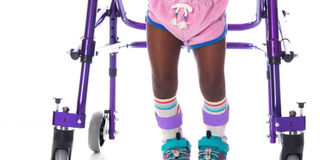School where children with cerebral palsy get a fighting chance

Cerebral palsy is a condition that causes impairment in muscle movement. PHOTO | FOTOSEARCH
Sandra is playing contentedly with her building blocks in the Progressive Class at the Cerebral Palsy Society of Kenya (CPSK) School in Nairobi’s Donholm. She is part of the eight learners that make up the beginners’ class at the school.
The shy, but quietly assertive, eight-year-old was prematurely born to Florence Were. Since then, she has fought a brave battle to secure her place in a society where awareness of her condition is limited and often clouded with suspicion and falsehoods.
She is living with spastic cerebral palsy (CP), a developmental disorder caused by damage to the brain before birth, during delivery, or within the first few years of life. Spastic CP prevents the normal development of motor function, and is characterised by tightness of the muscles, jerky movements and stiff joints.
Her sister Rebecca Were says the girl loves to listen to soft gospel music and does not like it when adults in the house quarrel. “When she hears voices raised in a quarrel, she will cry in an attempt to make peace between those arguing,” says Rebecca, 22.
Sandra cannot speak in words that are clearly recognisable in ordinary speech, but has developed a system of sounds and signs that alerts her caregivers on her needs, ranging from hunger to the need to visit the washroom.
Another child plays alongside Sandra. Her mother Sarah Moraa, a caregiver at the institution, remembers the day she gave birth to her daughter Britney. “She was born after a long period of labour and the doctor at Gucha Level Five Hospital told me not to breastfeed the child when I went home. He told me the child was tired after a long period of labour,” says Moraa.
It was only at four months that a visit to Kenyatta National Hospital would reveal Britney had cerebral palsy. “She has been nothing but a blessing to me,” says Ms Moraa.
FACE STIGMA
CPSK chairperson Wanjiru Mwangi says the society depends on well wishers to run the school. “Most of the society’s members are parents of, or caregivers of children and adults who have CP,” says Ms Mwangi, who is the proud mother of 40-year-old Mwangi Njema, who has CP. “I will be taking him to the next edition of the Churchill Show that airs on NTV because he is a big fan,” says Ms Mwangi.
CP is a condition that causes impairment in muscle movement. “When the brain is damaged, the muscles’ ability to move is impaired. This is why we must train the learners to carry out normal everyday activities despite that challenge,” says occupational therapist Douglas Misiko, who is also in charge of the CPSK’s outreach programme for visiting children who cannot go to the school.
As the world marks Cerebral Palsy Awareness Month this March, many children with the condition face stigma and misconceptions, hindering their productive participation in society.
Despite this challenge, the society is determined to give the learners a firm footing in life through education, training and empowerment.
Apart from therapy to help them move their muscles and do normal activities like taking care of personal hygiene and basic communication with caregivers, learners are trained in diverse fields such as painting, beadwork, music and even participate in the Scout movement. “We train them in these activities to improve their hand-eye coordination, their ability to hold objects and also notify their caregivers of needs such as hunger and discomfort,” says Mr Misiko.
The school serves approximately 30 learners mostly drawn from Eastlands and the surrounding areas including Utawala, Athi River, Kayole among others. It offers physiotherapy sessions for training the learners to move their muscles and sit upright.
Very few facilities and government schools serve children with impairment and disability in the country. For instance, only KNH and Mama Lucy hospitals have clinics for children with CP in the city.
These facilities can only provide therapy sessions for children aged five and below, meaning that parents of older children have to seek services at private facilities that are often expensive.
A physiotherapy session at Aga Khan hospital costs Sh2,500 while one at Gertrude’s is Sh2,900. Nairobi Hospital charges Sh3,500 to Sh4,000, with KNH charging Sh500. CPSK charges Sh100 per session.
It is estimated that three per cent of the population of children in the country has the condition. CPSK faults the government for ignoring people with CP during the last national population census by leaving out details in the questionnaire that would have enabled it to capture data on the exact numbers.



